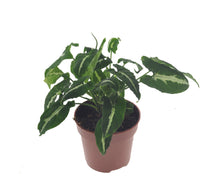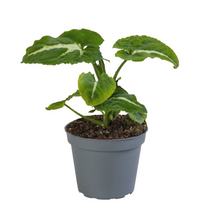Syngonium wendlandii is part of the Araceae family and its native range of this species is Costa Rica where it grows as a climber primarily in the wet tropical biome. This aroid features arrowhead-shaped leaves with a striking silver or light green central vein.
The genus name Syngonium comes from the Greek words syn (together) and gone (ovary), referring to the fused ovaries of the flowers. Wendlandii honors the German botanist Hermann Wendland.
Light: Syngonium wendlandii thrives in bright, indirect light. Direct sunlight can scorch the leaves, while insufficient light may result in less vibrant coloration and slower growth. A spot near a window with filtered light, or a room with ample ambient light, is ideal.
Water: Allow the top inch or two of soil to dry out slightly between waterings. Water thoroughly when you do water, ensuring any excess drains away. Overwatering can lead to root rot, while allowing the plant to dry out too much can cause the leaves to wilt and brown.
Potting mix: A well-draining potting mix is essential. A standard houseplant potting mix, amended with perlite or orchid bark to improve drainage, is a good choice. Avoid mixes that retain too much moisture.
Fertilising: Feed your Syngonium wendlandii with a diluted balanced liquid fertiliser every 4-6 weeks during the growing season (spring and summer).
Temperature: Syngonium wendlandii prefers typical room temperatures, roughly between 18-24°C.
Humidity: While Syngonium wendlandii can tolerate average household humidity, it appreciates slightly higher levels. Using a humidifier or placing the plant on a pebble tray filled with water can be beneficial, especially in drier environments.
Growth Habit: Syngonium wendlandii is a vining plant that can be grown in hanging baskets, trained to climb on a support, or allowed to trail. Providing a support, such as a moss pole, can encourage larger leaves and a more upright growth habit.
Toxicity: Syngoniums wendlandii is toxic if ingested, so it's best to keep it away from pets and small children.



